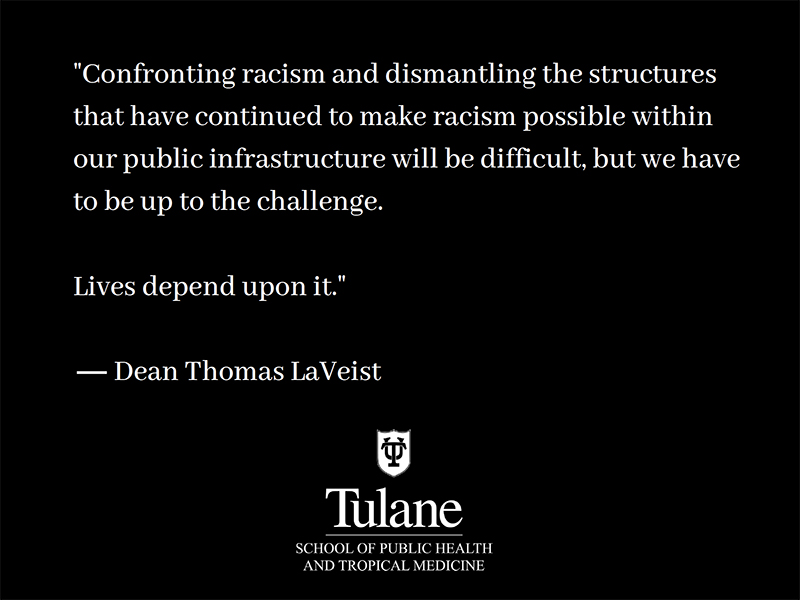Message from Dean LaVeist: Confronting Systemic Racism and Police Brutality

Dear SPHTM Community,
I’m deeply saddened as I know all of you are over the senseless killing of George Floyd in Minnesota last week.
I wish his death was an outlier, an aberration, an unusual event. But we all know that is not the case.
I’ve spent my career trying to save lives and improve health, delving into why Black Americans live sicker and die younger than their white counterparts. To be sure, sometimes the cause of death is heart disease, cancer, or, now, COVID-19. Sometimes the cause of death is violence, abuse, and hatred.
Sometimes – too often – that cause is at the hands of those entrusted with our safety.
George Floyd died a violent, unnecessary death. He endured excessive use of force by a police officer. Cellphone video shows Derek Chauvin pressing his knee on Mr. Floyd’s neck, indifferent to his cries for breath. “I can’t breathe,” Floyd gasped, echoing Eric Garner’s final words as New York police officer Danial Pantaleo held him in a chokehold.
Mr. Floyd and Mr. Garner are not alone.
Alton Sterling. Botham Jean. Philando Castile. Michael Brown. Jamee Johnson. Sean Reed. Steven Demarco Taylor. Terrence Franklin. Miles Hall. Michael Dean. Samuel David Mallard. E.J. Bradford. Stephon Clark. Breonna Taylor. Sandra Bland. Atatiana Jefferson.
There are even children, Tamir Rice, and Antwon Rose.
Each of these is a horrific, individual case, but collectively they (and others) speak to a deep, cancerous, systemic racism that affects every black and brown person in our country. As we, public health students, faculty, and practitioners, strive each day to improve health, there are public infrastructures that have been built in ways that work against us and work against people of color.
Last fall, we recognized 400 years of Inequality, the anniversary of the first enslaved Africans in the New World. The death of George Floyd shows us that we are still very much fighting against that horrific past, we are still reconciling the deep-seated racism stubbornly intertwined into our political and public systems.
We cannot expect to have a positive outcome, to achieve health equity if the public agencies we count on to protect us are designed to dominate, control, and even kill people of color needlessly.
There’s a lot of work to do, but we all, each of us, have to start. We have to start talking about racism and pushing back against it. We all have to say, “No more.” We have to demand better from our police departments, our mayors, our governors, our president.
Confronting racism and dismantling the structures that have continued to make racism possible within our public infrastructure will be difficult, but we have to be up to the challenge.
Lives depend upon it.
